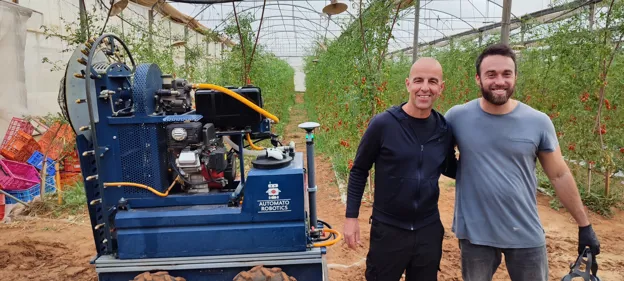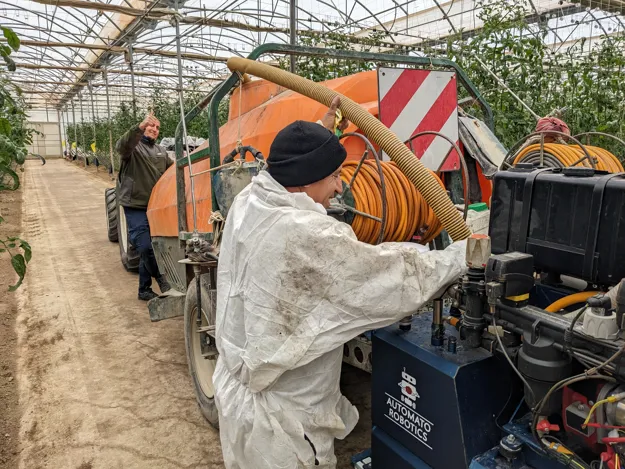Automato Robotics is an Israeli-based company specializing in robotics and software used for passive greenhouses, where no infrastructure for automatization is found and aims to face the labor crisis in agriculture and to reduce pesticide use in those greenhouses with their innovations.
"We realized that in addition to the difficulties in hiring workers, the people who end up working in agriculture are exposed to toxic materials, such as pesticides. With our robots and software, we want to improve these conditions for the roughly 5 million hectares of passive greenhouses and protected environments worldwide," says Dror Erez, CEO of Automato Robotics.
Over the past year and a half, the company developed the AutoSprayer using their autonomous platform for greenhouses which is also used for their tomato harvest robot and a collaborative tomato pollination robot as well. AutoSprayer suits all varieties of greenhouse crops, saves on workforce, and can precisely control the flow of materials flow. The robot was launched in Spain last summer.
Coming to Spain and Israel
The main target market for the company is Spain, given that the biggest concentration of passive greenhouses can be found in the southern Almeria region. However, when this was announced, growers in the company's home country of Israel started to ask for the product as well.
"We applied for government subsidies to help us launch in Israel. We had to adapt the product to the Israeli market since there are some differences between Israeli and Spanish greenhouses. Most of the greenhouses in Israel have poles in the middle of every third row to hold up the roof making it more difficult for robots to navigate the greenhouse autonomously. Solving this issue was no easy task, but after three months, we adjusted our navigation software to more accurately maneuver through the narrow paths between the poles and the crops. As a result, our navigation software is far more accurate than before, so ultimately, the challenge helped us improve our product," says Dror.
As a result of that, Automato Robotics has started providing their services in both Spain and Israel, with Perichan Group in Spain and in Israel with Malka farm.
 AutoSprayer in Malka farm, Israel
AutoSprayer in Malka farm, Israel
A service-based industry
By the end of the day, the company aims to provide autonomous spraying services as a business model since they believe that, in about two years, the market will be service-based instead of purchase-based as it is now.
"We want to be ahead of this trend. And our platform will offer more services as well. However, at the moment, most national subsidies around the globe still focus on purchasing products and robots, so the companies can get the subsidies from their countries but need to buy a product with it instead of paying for a service. Because of this, we started selling the robot to penetrate the market."
The company still has the service model in place and will extend it until they can make the switch to only providing services.
 AutoSprayer in Perichan Group, Spain
AutoSprayer in Perichan Group, Spain
Next up: Spot Spraying
Despite the great strides already made by the company in the field of pesticide reduction, the end goal on their roadmap is still far out of sight, the end game known as Spot Spraying.
"Right now, pesticide spraying isn't done very precisely. There is no real control in the process. You have a tank, you spray it around the greenhouse, and that's about it. Technology helps to continuously control the flow. With our sprayer, we can control and measure precisely how much is sprayed in every meter of every row. But that's just a start. Spot Spraying is the eventual goal. Having robots dive through the greenhouse autonomously, detecting the disease or pest in the preliminary stage, and spraying only the exact spot that is needed, wasting nothing in the process and minimizing the pesticide use to its most minute form," Dror concludes.
Currently, steps are already being taken towards this admirable end goal, with experiments being done at Bayer. More about this will be discussed in the follow-up article, where Dror will go more in debt on the experiments and Spot Spraying as a concept.
On the other hand, Automato Robotics, such as many other robot companies, is seeking investment in order to expand AutoSprayer sales and implement more services. "The combination between the Agritech boom and the financially challenging times for robotics developers offers a unique opportunity for investors," claims Dror.
For more information:
Dror Erez
Automato Robotics
17 Yahalom Street
Beit Yehoshua
4059100
Tel.: +972 547684989
www.automatorobotics.com
